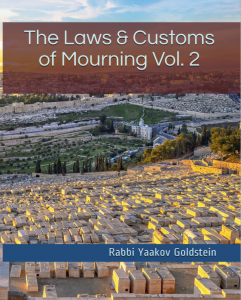*As an Amazon Associate I earn from qualifying purchases.
The 30th day:[1] As soon as sunrise arrives on the thirtieth day from burial, the mourning restriction of Shloshim cease from the Avel and it is now permitted for him to perform these previously restricted actions. It is not necessary to wait until the conclusion of the thirtieth day.[2] [The lesser restrictions of 12 months now take effect for those in mourning over the loss of a parent, and whatever is permitted and forbidden during the 12 months is permitted and forbidden from now on until the end of the 12 months. See Chapter 23 for all the restrictions that carry over from the Shloshim and apply throughout the 12 months and for those restrictions that no longer apply.]
[1] Michaber 395:1; Rosh; Rabbeinu Yerucham;
Ending Shloshim after Alos Hashachar: See Nitei Gavriel 1:5 footnote 5 that in a time of need it ends with Also Hashachar.
[2] The reason: As we apply the rule of “Miktzas Hayom Kekulo”, that part of the day is considered like the entire day. [Michaber ibid; Moed Katan ibid] Although by Shiva one must wait past sunrise, until the comforters leave, since comforters don’t come during Shloshim, it suffices to wait until sunrise. [Shach 395:1] Alternatively, since the laws of Shiva include active [remove sandals etc] and passive acts of mourning [i.e. don’t do], therefore one must perform some acts of the active form of Aveilus for some time into the day, and the Sages established for it to be done until the comforters leave. However, by Shloshim, since there is only passive Aveilus laws applicable, it therefore suffices to wait until sunrise. [Taz 402:5 in explanation of Reb Yichiel, brought in Tur 402]



Leave A Comment?
You must be logged in to post a comment.